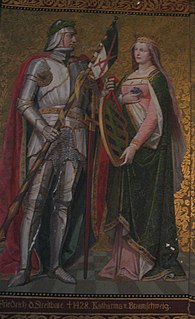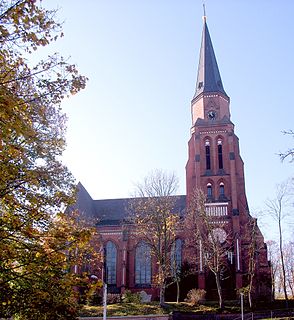Related Research Articles

Year in topic Year 1015 (MXV) was a common year starting on Saturday of the Julian calendar.
Bolesław the Brave, less often known as Bolesław the Great, was Duke of Poland from 992 to 1025, and the first King of Poland in 1025. He was also Duke of Bohemia between 1002 and 1003. He was the son of Mieszko I of Poland by his wife, Dobrawa of Bohemia. According to a scholarly theory, Bolesław ruled Lesser Poland already during the last years of his father's reign. Mieszko I, who died in 992, divided Poland among his sons, but Bolesław expelled his father's last wife, Oda of Haldensleben, and his half-brothers and reunited Poland between 992 and 995.

Year 1046 (MXLVI) was a common year starting on Wednesday of the Julian calendar.
The Peace of Bautzen was a treaty concluded on January 30, 1018, between the Ottonian Holy Roman Emperor Henry II and the Piast duke of the Polans Bolesław I Chrobry which ended a series of Polish-German wars over the control of Lusatia and Upper Lusatia as well as Bohemia, Moravia and Slovakia.

Saint Willigis was Archbishop of Mainz from 975 until his death as well as archchancellor of the Holy Roman Empire.

Frederick I, the Belligerent orthe Warlike, a member of the House of Wettin, ruled as Margrave of Meissen from 1407 and Elector of Saxony from 1423 until his death.

The Diocese of Dresden-Meissen is a Diocese of Catholic Church in Germany with its seat in Dresden. It is suffragan to the Archdiocese of Berlin.
The Bishopric of Merseburg was an episcopal see on the eastern border of the medieval Duchy of Saxony with its centre in Merseburg, where Merseburg Cathedral was constructed. The see was founded in 967 by Emperor Otto I at the same time in the same manner as those of Meissen and Zeitz, all suffragan dioceses of the Archbishopric of Magdeburg as part of a plan to bind the adjacent Slavic ("Wendish") lands in the Saxon Eastern March beyond the Saale River more closely to the Holy Roman Empire.
Eido may refer to:
Gunther was the Margrave of Merseburg from 965 until his death, upon which the march of Merseburg was united to that of Meissen.

The Diocese of Görlitz is a diocese of the Roman Catholic church in Germany. The current ordinary is Wolfgang Ipolt

St. Peter's Cathedral is an interdenominational church in Bautzen, Germany. It is among the oldest and largest simultaneum churches in Germany. Located in the heart of the city's "Old Town", the church and the square it is situated within is a major tourist attraction.
Eido I, also Ido, Eid or Ägidius, was the bishop of Meissen from 992 to 1015.
Eido II, was Bishop of Meissen from 1040 to 1045 or 1046.
Reiner of Meissen, also noted as Rainer, Reginbert, Rogmer or Reinbert, was Bishop of Meissen from 1065 to 1066. He was consecrated by Werner of Steusslingen, Archbishop of Magdeburg.
Reinward was Bishop of Meissen from 1140 to 1150.
Albrecht I of Meissen was Bishop of Meissen from 1150 to 1152.
Bruno von Porstendorf otherwise Bruno II of Meissen or Bruno II von Porstendorf was Bishop of Meissen from 1209 to 1228.
References
| Preceded by Eido II | Bishop of Meissen 1046–approx. 1065 | Succeeded by Reiner of Meissen |
| This article about a German Catholic bishop or archbishop is a stub. You can help Wikipedia by expanding it. |